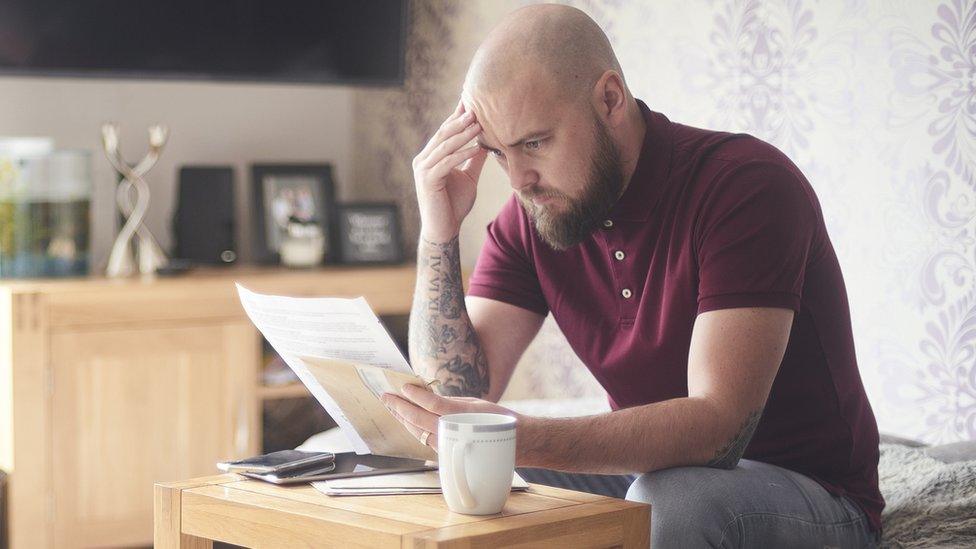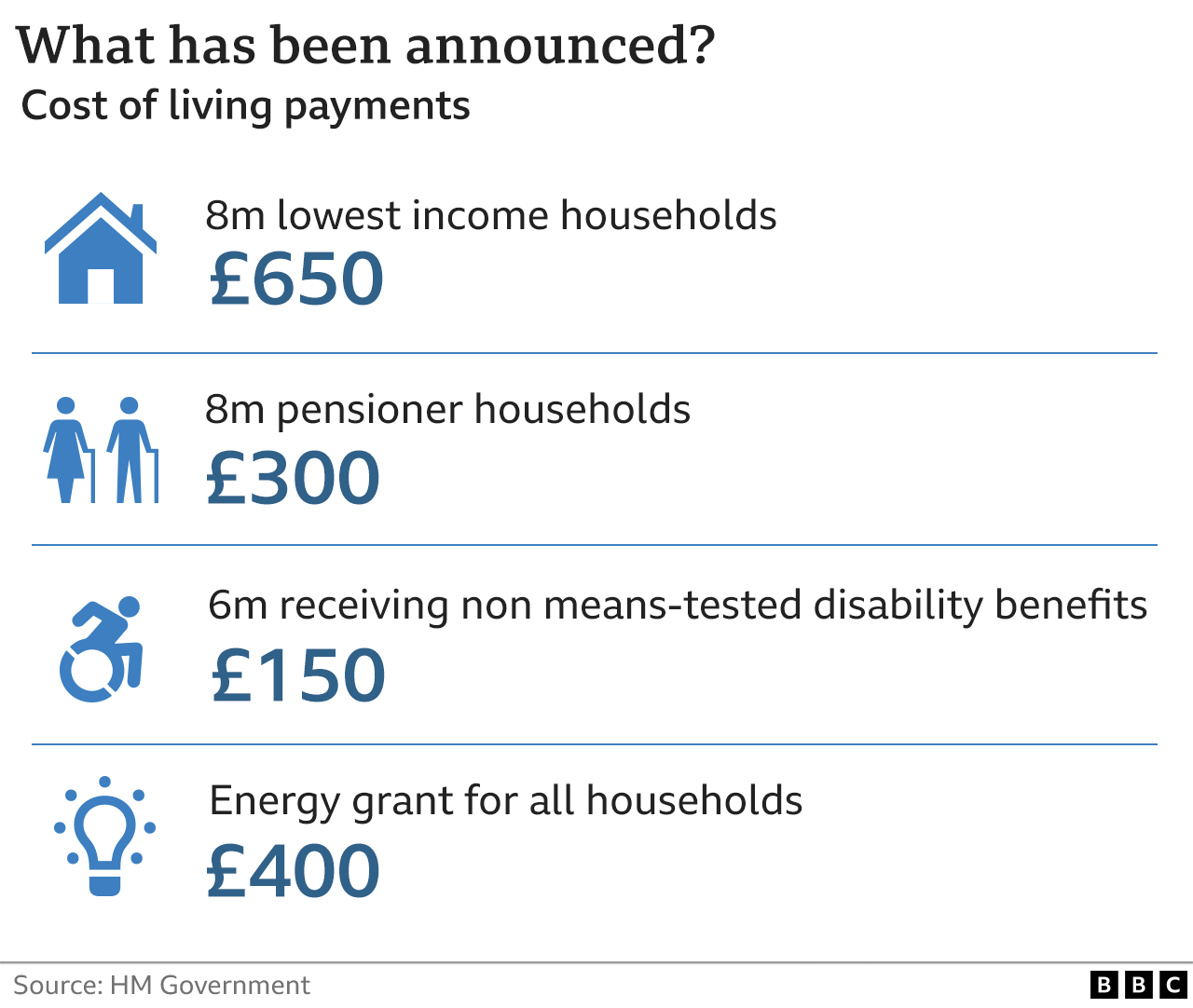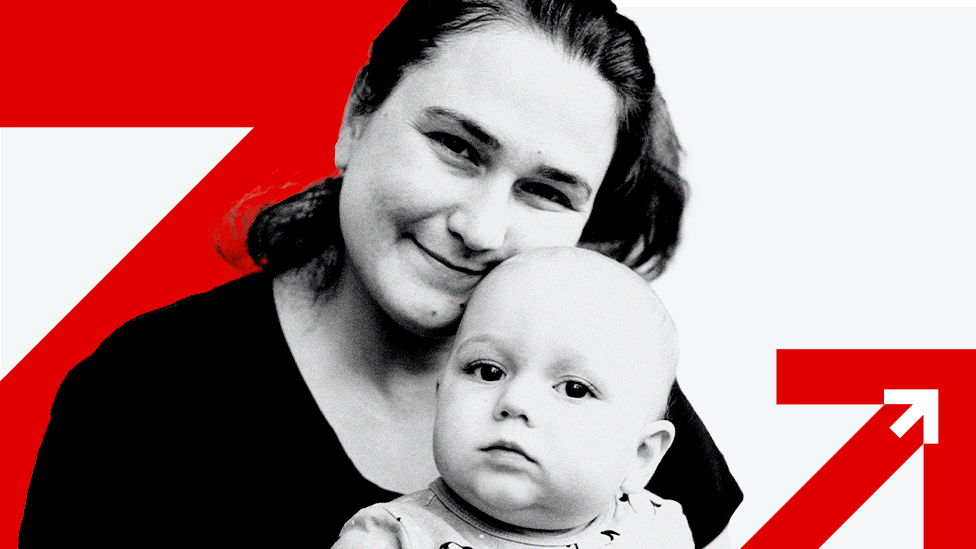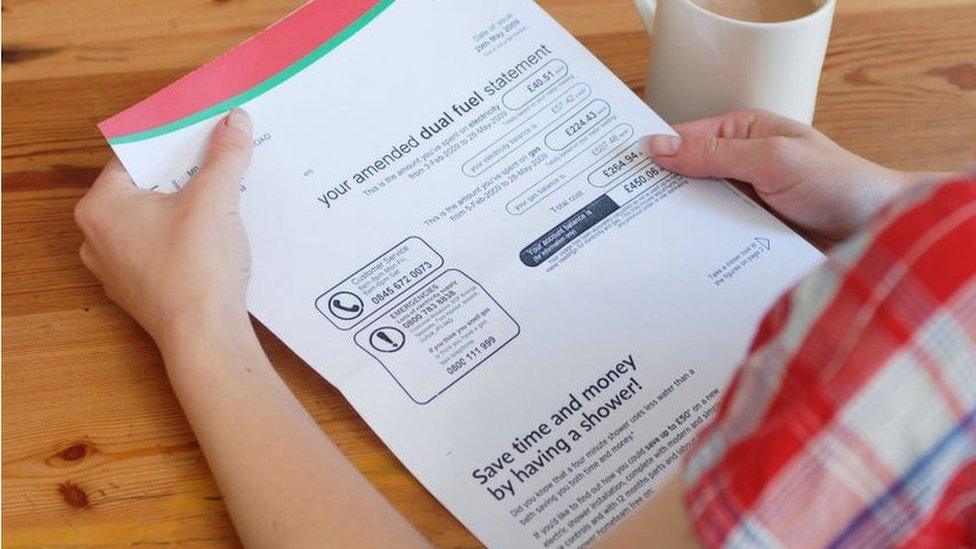Cost-of-living payments branded insufficient as energy bills soar
- Published
- comments

Ministers must offer bigger cost-of-living support payments as energy bills are expected to soar further this winter, a committee of MPs has said.
Financial help for the vulnerable and poor needed to be "updated" to reflect higher bills in October, they said.
Witnesses told the Business Committee: "If you think things are bad now, you've not seen anything yet."
Its report also called energy regulator Ofgem "incompetent". Ofgem said it was working hard to reform the market.
Overhaul of policy
In recent days, millions of low-income households on benefits have been receiving the first £326 instalment of payments to assist with the rising cost of living.
Further payments will come later in the year, including extra support for pensioners and people with disabilities, and a £400 discount on everyone's domestic energy bill.

Those payments were set when the typical energy bill was anticipated to rise by £800 - a prediction Ofgem says is now too low. Influential industry analyst Cornwall Insight has predicted a rise of more than £1,200 a year in October, pushing the typical bill to £3,244 a year from October, then £3,363 a year from January.

How is the rising cost of living affecting you? Get in touch.
WhatsApp: +44 7756 165803, external
Tweet: @BBC_HaveYourSay, external
Please read our terms & conditions and privacy policy

A normal bill at present is about £2,000 a year, which follows a £700 a year rise in April.
The Business Committee's report said the government's support package was "no longer sufficient"
"The impact of the energy price crisis on households is likely to cause an unacceptable rise in fuel poverty and hardship this winter," the report said.
"The government must immediately update its support, targeting this at customers who are on low incomes, fuel poor, and in vulnerable circumstances, and develop a scheme to support vulnerable customers to accelerate the repayment of energy debt resulting from this crisis."
The committee has been hearing from experts, ministers and industry insiders for months.
"We were told by a number of witnesses, 'if you think things are bad now, you've not seen anything yet,'" said Darren Jones, who chairs the committee.
The Department for Business, Energy and Industrial Strategy said: "No national government can control global inflationary pressures; however, we have introduced an extraordinary package of support to help households."
Ofgem failures
The wide-ranging report made a series of other recommendations, including:
consideration of the introduction of cheap, social tariffs for the most vulnerable
allowing prepayment meter customers to pay for energy after they have used it, rather than before
bringing in a "far-reaching" insulation programme in UK homes
Members of the Business Committee follow the Public Accounts Committee of MPs in heavily criticising regulator Ofgem for its role in allowing suppliers to set up and operate without sufficient oversight. It said there was too much focus on competition instead.
Owing to the failure of 29 companies, 2.4 million customers were moved to other suppliers, and often to more expensive tariffs, and one large supplier - Bulb - is in special administration.
"Ofgem has proved incompetent as the regulatory authority of the energy retail market over the last decade," the report said.
"It allowed suppliers to enter the market without ensuring they had access to sufficient capital, acceptable business plans, and were run by individuals with relevant expertise."
A spokesman for Ofgem said the regulator had been "clear and transparent" that suppliers and its own regime had not been robust enough.
"No regulator can, or should, guarantee companies will not fail in a competitive market but we are working hard to reform the entire market, as well as closely scrutinising and holding individual energy suppliers to account, to further strengthen the regulatory regime," he said.
Social tariffs
The committee also questioned the future of the price cap, which sets a limit on the cost of each unit of energy and the standing charge for domestic customers in England, Wales and Scotland.
It said the government should consider a social tariff instead for the most vulnerable, and then a relative tariff for everyone else.
Social tariffs were phased out by suppliers about a decade ago.
Prepayment meter customers, who pay for their energy in advance, have a different - slightly more expensive - price cap. Citizens Advice has warned that the number of people seeking help because they cannot afford to top up their meter has reached a new record.
This is known as self-disconnections and the committee said that Ofgem and suppliers should identify those at risk and allow them to pay for energy after they have used it.
The MPs also called for an "urgent, far-reaching, and long-term" insulation programme for UK homes.
"Ultimately, the UK needs to reduce its dependence on imported gas. Energy efficiency is the quickest and most cost-effective way to reduce gas demand and lower energy bills," the report said.
The Ofgem spokesman said: "We are also working with all parts of government and industry on the long-term solution to the energy crisis by moving us away from imports of expensive gas towards a more secure, reliable, home-grown energy system."
Related topics
- Published15 February 2024

- Published20 July 2022

- Published11 July 2022

- Published22 June 2022

- Published13 July 2022
